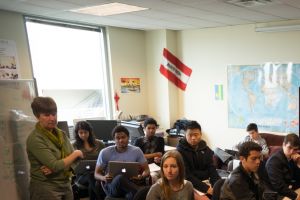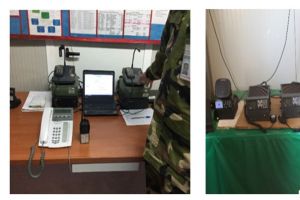Since the Brahimi Report, a high-level assessment of United Nations peacekeeping operations, there has been a call on the UN to better leverage computing and communications technology in support of their peacekeeping mission. This raises the question: How should these technologies be designed, and what values should they represent? This paper reports on an empirical qualitative investigation of computing and communication technologies and UN peacekeepers. We employed the Value Sensitive Design (VSD) theory and method to examine values in the design, use, and interactional product of ICTs with peacekeepers. This work was undertaken at the UN Multidimensional Integrated Stabilization Mission in Mali (MINUSMA). We conducted 12 focus group discussions among uniform and civilian personnel across the MINUSMA mission. Participating peacekeepers advocated for technologies that support specific human and professional values (e.g. non-discrimination or teamwork) and help sustain their own personal welfare (e.g. work-life balance). They also described physical security and design requirements for these systems. In this paper we focus on peacekeepers' reflections on the TETRA emergency two-way radio. Participants noted how the system captures or confronts various human and professional values, embodies design conflicts, supports physical security among peacekeepers, while ignoring welfare values. We conclude by proposing a technical investigation (a VSD step that includes the proactive design of new systems) to create a new handset that encompasses the welfare and human values of a mobile phone while embracing the security capabilities of the TETRA radio.

The Technologies and International Development Lab at Georgia Tech researches the practice, the promise, and the peril of information and communication technologies (ICTs) in social, economic, and political development. We study the risks and rewards of ICT systems for people and communities particularly within Africa and Asia. We explore issues of rights and justice in a digital age. And we examine new forms for inclusive innovation and social entrepreneurship enhanced through digital systems.
The T+ID Lab is an interdisciplinary community bringing together computer and social scientists with design and policy specialists. We collaborate directly with stakeholders outside of the Lab to critique technologies, invent new ones, and research how and why (or why not) ICTs can serve as a tool to empower, enrich, and interconnect.



